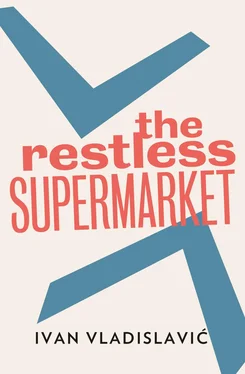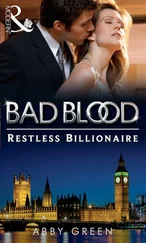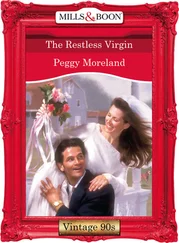Then his conscience assailed him, and he quickly restored the deletion.
*
As the disorder grew, so did the Fathers’ determination to overcome it. Team after team of brightly clad workers were dispatched to put things straight. In addition to the usual repairs and maintenance — attaching splints, driving in staples, welding railings, tarring poles, clearing pathways, burning firebreaks — they began to take an interest in the smallest details. Minders were employed to sit on park benches just to weigh them down, to cross the street whenever the little green man bade them walk, to cock the ears of the teacups in a westerly direction.
All this amateurish tinkering only hastened a spectacular descent into chaos. One morning, Alibians awoke to find that St Cloud’s Square had come adrift and rotated to the opposite quarter of the compass; had it not been moored in the south-east by the Musical Fountains of the Seven Martyrs, it would surely have floated away altogether. Glancing up as usual at the clock tower of St Cloud’s cathedral, as they filled their kettles at the kitchen sink, or threw open the shutters to do their morning exercises, or stooped to bring in the milk from their doorsteps, people saw nothing but sky.
On the outskirts of Alibia, among the sporting-goods factories and balsa-wood mills, in the peri-urban badlands, in the housing estates and low-cost townships, where the building regulations had never been applied with rigour and foundations were shallow, the disorder was precipitate. Whole streets suddenly banged together, like two halves of a book slammed shut by a reader, smashing everything in between, animate and inanimate, to pulp and tinder. Blocks of flats turned topsy-turvy, raining down the occupants and their possessions, and re-established themselves with their roots of cables and pipes twisted in the air, like so many baobab trees. People found themselves living on top of one another, cheek by jowl with exactly the types they wanted nothing to do with.
Through it all, the Proofreaders did what they could to preserve the proper boundaries between things. But in the end, maintaining order requires concerted communal effort. As fast as the Members corrected errors in one quarter, new — and worse — ones sprang up in another. Proofreading was thankless work, as they never tired of saying. And the fact is that without Fluxman, the great strategist, their efforts lacked design. Where Banes might be tempted to spend an entire afternoon taking back cups and saucers in the disorganized canteens of the General Post Office, or taking over buds on the rose terraces at the Botanical Gardens, Fluxman would concentrate on the menus or rearrange the phyla in the family trees. Moreover, Fluxman was possessed of the single most important tool in the proofreader’s bag:  . For delete.
. For delete.
But what Fluxman would have done is immaterial, for he refused to do anything at all. He withdrew from the campaign; he stopped coming to meetings at the Café Europa. He closed his ears to the pleas of his colleagues and stayed at home, quietly minding his own business.
Everyone assumed that Fluxman’s withdrawal was a straight-forward protest against being snubbed by the City Fathers. Only to Munnery had he opened his heart. ‘Delete is a dangerous weapon,’ he said, hacking idly at the air between them with a sign as keen as a sickle. ‘I’ve always known it, of course, and I’ve always trusted myself to wield it righteously. But it’s no longer safe in my hands. Let me loose on this degenerate world, and there’s no telling what I’m capable of.’
A year passed. The city fell into ruins.
*
Now Fluxman, ensconced at Al Fresco’s with the espresso gone cold before him and the corn-roaster’s smoke stinging his eyes, had time to consider whether he had been right after all to wash his hands of the Society’s problems. He surveyed the passing parade. How odd that he should consider this shambles ‘fashionable’. What a change had been wrought since the great unfastening. Before then, it had shamed people to be seen with a thread out of place; now, no one cared about appearances at all. It was nothing but particoloured suits and patchwork as far as the eye could see. Men in dresses, women in bed-linen togas, winding-sheets and corsetry. The very idea of an outfit had become laughable. No matter how much care you took over your grooming, there was no telling if it would last. You might step out in a lounge suit and wind up in jodhpurs. Why bother?
The corn smoke turned to an exhalation of cigars, and through this fragrant haze, a vision of Alibia in its heyday rose up to taunt Fluxman. He saw the interval crowds in Opera House Square, a mass of swirling silk and manly gabardine under rafts of picture hats and lively conversation. Rows of gleaming limousines under the limes, the chauffeurs in their uniforms, scarcely less elegant than their dress-suited masters, so gloriously accoutred for motoring you would have thought they were commodores. He saw himself passing through the arcades, with a paper cone of chestnuts in the pocket of his frock-coat warm against his thigh, going down the steps to the river, where lovers were leaning on the parapets to watch the moon dissolve like a paper doily in the Indian ink of the water, passing purposefully out of the more fashionable avenues into the stonier quarters, where the houses huddled closer and closer together, turning their lichen-clad backs against the night, past a steaming horse, up an alley-way where the shadows lay thick and velvety as coaldust in every corner. There was a spring in his step, a hope in his heart. The heels of his brogues resounded like hammerblows on the flags, his breath puffed out in chubby balls of cotton wool, a chill breeze lifted the offhand gesture of his scarf. Winter had fallen here. Turning into a narrower passage, thrusting his fists deeper into his pockets, he came to a lighted window. From within he heard laughter, the crushed ice of a piano, the chime of glass against glass, the drayman’s chorus. Leaning close to the panes, he peered in, but they were misted over and weeping.
The earth shook and Fluxman knew at once that some larger-than-ever upheaval had declared itself. He uttered an uncharacteristic curse. To be facing the end at Al Fresco’s. It was not exactly becoming. At least he was sitting down. Another lurch and a thud like a boulder on a coffin lid. What could it be? He tossed the espresso, cup and all, into the gutter where it would not foul his clothes, and looked about. Everywhere people were running and falling. There, that was the problem: the department store on the other side of the Avenue of the Revolution. It was rocking on its foundations, bearing up and sinking back again, like a ferry aground on a sandbar. Squirts of dust and squawks of metal issued from the parking garage. You’d think the basement was full of hippopotamuses.Why was some brutal force always butting its head against the undersides of things? The strain was so immense that the end was bound to be shattering. The building would fly into smithereens. Hardly had the thought crossed his mind when the store flew into the air and vanished over the rooftops, scattering a potpourri of saloon cars and scented girls from the make-up counters. A flying building! There was a moment of blank embarrassment, while a cloud of red dust swirled in the gaping socket. Then something crackled in the distance and a shanty town appeared on the horizon, just where the store had diminished to a speck, grew larger with frightening rapidity, and fell with a crash into the hole. The impact caused several shacks to collapse, and all the rest to creak and shiver. Plumes of smoke rose up from the jumble of corrugated iron and splintery wood, and a river of moaning and wailing poured out.
Читать дальше

 . For delete.
. For delete.










